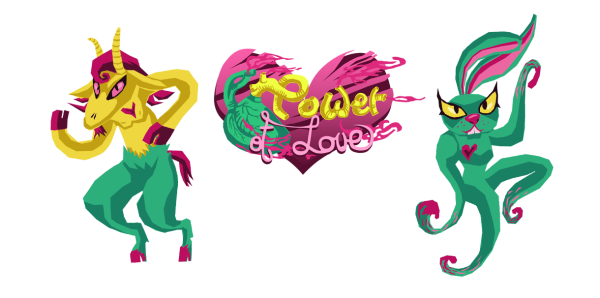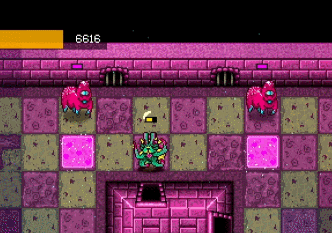A decade ago we were students of multimedia design at the Burg Giebichenstein, an art school in Halle, Germany. Probably our most memorable time there was when Peter Hann, who was part of the Sacred 2 development team, was brought in by Professor Bernd Hanisch and became our tutor for a semester. He gave lectures in game creation, and we could prototype our very own game ideas (Fascinated By Evil by me, and Mummenschanz by Jana). It was an inspiration to be able to talk to a game designer from the industry, who is also a very good technical artist.
Last semester, years later, we finally had the chance to do something very similar, but of course with our own "twist". Jonas Hansen, professor at the very same degree programme we were part of back then, invited us to be tutors for a semester project (“Kreatives Gestalten” - usually a free project where students can decide the focus themselves). We would think of a theme for the applicants to follow, and then support our students with advice and suggestions, and finally grade their results. An interesting opportunity indeed, and of course we said yes.
After a few sessions of thinking and discussing we decided for the topic “memories”. The title “Play Your Self” would emphasize that our course is about creating a game that tells of a personal experience, so it was narrower than the usual semester project proposals. 13 students applied. We were thrilled.

When the semester started, we asked each student to draw their portrait on a piece of paper, which already served a purpose of finding out how everybody saw him-/herself. We also had a much easier time remembering names and faces later on. Right after this introductory routine we did a play session - everybody had to do a short “Let’s Play” of one of 13 personal indie games we selected beforehand, and talk about it while playing. This would tell us how experienced our students were with indie games and art games.

The next week we made it personal. We tasked the students to bring along an object connected with a strong memory; ideally something small-ish and unique (both in terms of the object and the memory). They had to talk about it in front of the class, and then try to create a rough, short game concept for it. It would prepare everybody, us included, theoretically of what was about to be expected of this semester.
On the practical side we thought of a ‘game jam’ for the week after this. On Monday we presented a text by Christian Morgenstern, Der Zwölf-Elf, a very linguistical poem with twelve verses. We assigned each student one of the lines (the 13th got the title) with the task to create a room that conveys an interpretation of that verse. The room should tell a small story by revealing the line in the end, and allow the player to leave it. Amazingly, on Wednesday all the students could present a result, even though some of them didn’t know the engine well, or weren’t comfortable with 3D modeling. Interesting enough, a lot of the created rooms actually were open spaces (usually with forests).

We had to be pretty rigid in regard to the limitations of this jam: the room had to be 3D, first-person, and made with Unity. This way, we could mash all of them together into a single Unity project, in order to ultimately create a “hotel” with a lobby and 13 rooms. The final Zwölf-Elf game can be downloaded on itch.io.
(YouTube videos try to set cookies and contact Third Party servers!)
These sessions concluded the preparation part - from now on every student had to think about the memory they wanted to translate into an interactive game, and how they would like to achieve their goal. Some memories were very specific in time and place, others concentrated on a place only from the student’s general past, others on a person who is dear to them. Some games became 3D, others 2D. Two of the students tried Unreal more or less for the first time and yet succeeded - kudos! A highly interesting (and entertaining) mix indeed.
After the idea and concept phase we demanded timetables and weekly status reports - which sounds more strict than it was. We just wanted to make sure nobody was out of the loop, and everybody would be serious about their personal, emotional experience. That’s why we also set up a public blog, for everyone to post progress updates and musings.

At one point we assigned groups of three to four students who would then play-test the current state of their projects; which was something we already did with the Zwölf-Elf rooms. We felt this could have been done more often, but then again we are aware most semester projects are only playable shortly before the final presentation. It also didn’t help much that the pandemic was still going on, and after the first few weeks we had to move all consultations to Jitsi. Even though chats (e.g. via Discord) were available all the time, a presence at a real location would have been better for bonding and interim test sessions.
The final presentation at the end of the semester was held online too, and this time the other professors (which also were our professors back then) of the degree programme would watch. The presentation went smooth, because together with Professor Hansen we decided that our students should make presentation videos beforehand, instead of doing live presentations. This was because of the often wonky internet connections, and Jitsi’s subpar screen-sharing abilities.
(YouTube videos try to set cookies and contact Third Party servers!)
We liked all of the results; nearly everybody stuck to the idea from the beginning and could showcase a polished prototype representing their memory, and their abilities as designers, very well. We are super proud.
Would we like to be tutors again? Very much so! Alas, we also learned something: it’s a lot of work. Consultations with our students happened only once every week, but preparation work, discussions and other things made the job a lot more time-consuming, even though it was always fun of course. (Un)fortunately we have a new game project currently, and we need to do our own timetables and status reports for the next foreseeable months.
Hopefully we can show more of our project soon. From time to time we stream our development process, which currently consists of researching stealth games. And of course there's still our Discord!






 Although Power of Love, our co-op dungeon crawler made for the
Although Power of Love, our co-op dungeon crawler made for the 